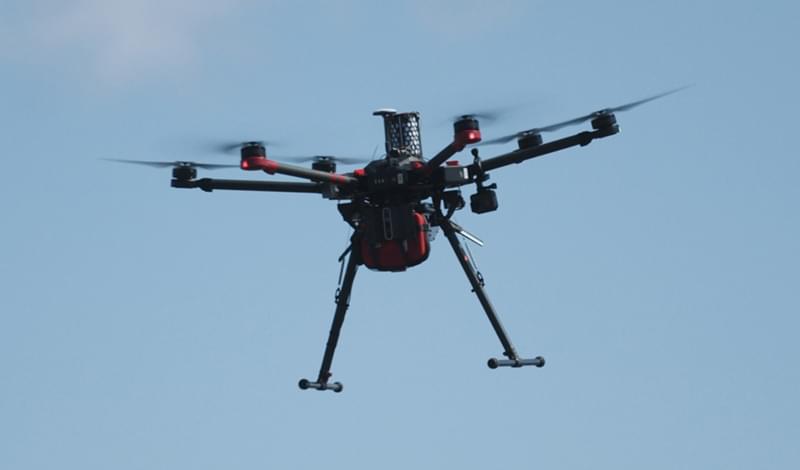On Saturday, the James Webb Space Telescope successfully unfolded its primary mirror, a massive milestone in its mission.


A major obstacle to widespread study and clinical use of 3D tissues is their short shelf-life, which may be anywhere from a just few hours to a few days. As in the case of an organ transplant, a bioprinted tissue must be transported rapidly to the location where it is needed, or it will not be viable. In the journal Matter on December 21st, researchers at Brigham and Women’s Hospital and Harvard Medical School describe their work combining 3D bioprinting with cryopreservative techniques to create tissues which can be preserved in a freezer at-196°C and thawed within minutes for immediate use.
“For conventional bioprinting, there is basically no shelf life. It’s really just print, and then use, in most cases,” says lead author Y. Shrike Zhang (@shrikezhang), a biomedical engineer at Brigham and Women’s Hospital. “With cryobioprinting, you can print and store in the frozen state for basically as long as you want.”
The use of 3D bioprinting to create artificial human tissue first appeared twenty years ago. As in conventional 3D printing, an ink is extruded layer by layer through a nozzle into a pre-specified shape. In the case of bioprinting, the ink is typically made up of a gelatin-like scaffolding embedded with living cells. Cryobioprinting works the same way, except the printing is performed directly onto a cold plate held at temperatures down to-20°C. After the tissues are printed, they are immediately moved to cryogenic conditions for long-term storage.



According to new research by Datagen, 99% of computer vision (CV) teams have had a machine learning (ML) project canceled due to insufficient training data. Delays, meanwhile, appear truly ubiquitous, with 100% of teams reporting experiencing significant project delays due to insufficient training data. The research also indicates that these training data challenges come in many forms and affect CV teams in near-equal measure. The top issues experienced by CV teams include poor annotation (48%), inadequate domain coverage (47%), and simple scarcity (44%).
The scarcity of robust, domain-specific training data is only compounded by the fact that the field of computer vision is lacking many well-defined standards or best practices. When asked how training data is typically gathered at their organizations, respondents revealed a patchwork of sources and methodologies are being employed both across the field and within individual organizations. Whether synthetic or real, collected in-house or sourced from public datasets, organizations appear to be utilizing any and all data they can in order to train their computer vision models.
However, computer vision teams have already identified and begun to embrace synthetic data as a solution. Ninety-six percent of CV teams reported having already adopted the use of synthetic data to help train their AI/ML models. Nevertheless, the quality, source, and proportion of synthetic data that’s used remains highly variable across the field, and only 6% of teams currently use synthetic data exclusively.

Today’s Google Doodle honors the late physicist Stephen Hawking on his 80th birthday. Hawking was a renowned cosmologist, and he spent his career theorizing about the origins of the universe, the underlying structure of reality, and the nature of black holes. But he became a household name for the way he communicated those ideas to the public through books and TV appearances.
“My goal is simple,” he once said. “It is a complete understanding of the universe, why it is as it is and why it exists at all.”
One of Hawking’s best-known ideas is that black holes slowly regurgitate information about all the matter they’ve swallowed — but it comes out in a jumbled form called Hawking radiation. In 1974, Hawking proposed that the event horizon of a black hole emits energy. Because energy can be converted into mass, and vice versa (that’s what Albert Einstein’s famous equation E=MC2 tells us), emitting all that energy into space will shrink the black hole. Eventually, it will run out of mass and disappear.
Full Story:

In the state of Washington, advocates hope that the third time’s the charm for passing community solar legislation.
For this episode of the Local Energy Rules Podcast, host John Farrell speaks with Mason Rolph, President of Olympia Community Solar. In the absence of supportive state policy, Rolph has found a way to develop community solar gardens that reward subscribers. Farrell and Rolph discuss Olympia Community Solar, the organization’s advocacy work, and why Washington needs a proper community solar program.
Listen to the full episode and explore more resources below — including a transcript and summary of the conversation.

Incredible footage has emerged of a private jet roaring through a narrow pass in California’s so-called Star Wars Canyon.
Aviation photographer Christopher McGreevy captured the breathtaking flight of a Dassault Falcon 8X private jet thundering through the canyon that crosses Riverside and San Diego County in Death Valley National Park.
It is unclear who was flying the jet through the valley, which is made from walls of red, grey and pink rock which look similar to the fictional Star Wars planet Tatooine — Luke Skywalker’s home planet.
Artificial intelligence’s lack of transparency is leading many to fear the technology and others to elevate it to a mysterious god-like figure, but we should be more critical of those making decisions about how AI is used, says anthropologist Beth Singler.
We’re moving past the bottleneck of available space launches.
The bottleneck nature of space launches is beginning to change.
In the last several years, the unprecedented growth of public-private partnerships has transformed space travel into an irresistible investment opportunity. “Since July last year we’ve had about a dozen millionaires take selfies in space,” said Tess Hatch, a partner with Bessemer Venture Partners (BvP), during a CES 2022 keynote attended by Interesting Engineering.
But there’s more to the budding space economy than tourism, alone. In fact, despite the outsized attention focused on billionaires and millionaires going to space, the vast majority is already going to support a much wider spectrum.
But how will that serve life down here on Earth?
Full Story: